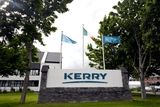Finding the next generation of Irish giants
Enterprise Ireland CEO Julie Sinnamon tells Gavin McLoughlin about the agency's drive to help homegrown firms scale up
Innovator: Enterprise Ireland CEO Julie Sinnamon at its head office in East Point business park in Dublin. Photo: Arthur Carron
There's probably no-one more important than Julie Sinnamon when it comes to developing Irish businesses.
As head of Enterprise Ireland she leads the world's third-biggest venture fund by deal flow - giving money to around 200 new startups every year.
Making a return isn't the top priority - it's more about functioning as a development agency.
Her ambition is to create more indigenous companies of scale, to join the likes of CRH, Ryanair or Kerry Group.
That's become increasingly important of late with US President Donald Trump's tax reforms - and global reform of multinational taxation more generally - perhaps putting more of a question mark over the future of foreign direct investment here.
What, then, is her strategy for her achieving her goal?
"Innovation is probably an area that we will spend more time on going forward," Ms Sinnamon says. "If we look at the companies that are succeeding internationally at growing their exports, those that are spending money on innovation and really developing new products have an increasing amount of their turnover being accounted for by the products that they've developed over the last few years," Ms Ms Sinnamon says.
"It's not a cost, it's actually an investment in your business - if you want to grow your global sales you need to invest in innovation. That's something where we are not as strong as a country as we should be and it's a big focus."
Her comments echo those of Ashoka Mody, the former IMF mission chief in Ireland, who in a recent speech here, cited OECD statistics showing Ireland lagging well behind many advanced economies when it comes to the percentage of GDP spent on R&D activity.
He said redressing the problem will require "extensive investment in education" and "creating an economic environment in which domestic companies invest 2pc-3pc of GDP" in R&D. "The one feature in which Ireland is very much like what used to be called the eurozone periphery is it's got a very low internal innovation capability. And growth will belong in the next half century to those who have internal innovation capacity," Mr Mody said.
A native of Co Down, Ms Sinnamon has business in her blood. Her family was involved in the poultry business, but she ended up as something of an FDI 'lifer'.
She did a degree in business studies at the University of Ulster, and then came to Dublin to do a placement for First National Bank of Chicago in the late 1970s, a "fairly tough time" in Northern Ireland as she puts it.
She loved Dublin, and was "amazed" at the level of foreign direct investment south of the Border.
After doing a thesis on multinational decision-making between Northern Ireland, Scotland and the Republic of Ireland, she came back to Dublin to work for Trinity Bank, before joining the IDA when it was on a recruitment drive.
There, she worked mainly with food companies, including Monaghan Mushrooms, Rye Valley and Green Isle, and that experience made her want to stay on the exporting side of the house when the IDA was split up and Enterprise Ireland was ultimately born.
The job she's in now has many different strands to it: working with client companies to boost innovation, competitiveness and diversification; working with Departments and other State bodies to make sure they are all singing off the same hymn sheet; holding speaking events to inform the public; and travelling to foreign countries on trade missions.
She's just back from one such mission to China, where an Irish delegation attended the world's largest trade exhibition. Business Minister Heather Humphreys was in attendance too - something which Ms Sinnamon says makes a big difference in Asia in particular.
Ms Sinnamon's working relationship with Government is good, but that doesn't mean she can't point out areas for improvement. The tax treatment of entrepreneurship has long been criticised, and Ms Sinnamon says we have fallen behind the UK in that regard. One area that's often zoned in on is entrepreneur's relief from capital gains tax, where the UK has a far more generous system.
"We compare ourselves a lot with our nearest neighbour and I think the UK at this stage has a more attractive package of incentives in the tax side for growing companies than we have," Ms Sinnamon says, adding that she recognises that the Government has indicated its intent to make changes in this area.
"It's something which I see would help to further accelerate the growth of Irish companies if you had a strong package of tax incentives to support that growth."
Another area Ms Sinnamon wants to focus on is competitiveness. Pressures on labour are seeing some companies pay more for skills than they might otherwise do, while housing costs are putting pressure on wages too, she says.
Hence Enterprise Ireland's focus on 'Lean' programmes, designed to boost a company's efficiency.
Making plans for dealing with Brexit is another important day-to-day action.
There's been a raft of surveys and reports indicating that many Irish businesses had their heads in the sand on the issue, but Ms Sinnamon says the message has gotten through.
"When we did our international markets week in 2017, only 38pc of the people in the room - and those were the people who were there to diversify - said they had taken any steps to prepare for Brexit. We had a markets week about five weeks ago and that figure had gone from 38pc to 85pc... we're certainly seeing companies moving from the denial phase to realising they have to have a plan"
To achieve more Irish businesses of scale, more indigenous IPOs will be needed.
It's difficult to achieve this though, when entrepreneurs are often heavily indebted and get a chance to lift the burden when a trade-sale buyer comes along with a big cheque.
An increasing number of Enterprise Ireland's startup clients are set up by people who are on their second company, having sold out of their first and then coming back to the table with more experience, which helps build a bigger, stronger company second time round.
"I would like to see more trade sales at a later stage in the life cycle of a company... the people who buy the company are very often the people who really make the good return on it because the company has sold out at an early stage.
"And if [the entrepreneur] just held on longer they would be able to get a better return for the risk that they took at the early stage of the company.
"That requires investors to come along and when they're committing equity to a company to allow the people who started the company to take a bit of money off the table, to clear their debts, to recommit and to be able to stay in longer and build on their experience and build a stronger company."
After that, she says, the IPO option can come into view - with sectors like medtech and software among those with the potential to provide the next generation of big Irish companies. Boosting female entrepreneurship is a priority too. Ms Sinnamon says that women appear to be more influenced by role models, so the agency is trying to put more spotlight on successful female businesspeople.
"Confidence and ambition are issues - the lack of confidence, and that isn't just obvious in the entrepreneurial side it's obvious in terms of women in the workplace going forward for promotions," she adds, saying that childcare issues and having fewer females working for venture capital funds in general can also have an impact.
The agency has had good success in this regard. In 2011, 7pc of its 'high-potential' startups had a female involved. Last year the figure was 28pc. It's substantial progress, and well ahead of many countries, but more is needed to help Ireland access the largest talent pool and meet Ms Sinnamon's target of having more indigenous companies of scale.
Join the Irish Independent WhatsApp channel
Stay up to date with all the latest news














